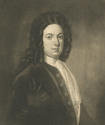 Andrew Cochrane of Brighouse (1693-1777), a wealthy tobacco merchant, was Lord Provost at the time of the 1745 Jacobite Rebellion. A staunch Hanoverian, he had the onerous responsibility of negotiating with Prince Charles Edward Stuart (1720-1788) when the Jacobite army passed through lowland Scotland towards the end of 1745. Cochrane originally came from Ayr, the county town of Ayrshire, where his father was a merchant. He settled in Glasgow in 1722 and the following year married Janet Murdoch (1699-1786). He subsequently entered into partnership with his brother-in-law, John Murdoch (1709-1776), and the pair established the successful Virginia trading firm of Cochrane, Murdoch & Company.
Andrew Cochrane of Brighouse (1693-1777), a wealthy tobacco merchant, was Lord Provost at the time of the 1745 Jacobite Rebellion. A staunch Hanoverian, he had the onerous responsibility of negotiating with Prince Charles Edward Stuart (1720-1788) when the Jacobite army passed through lowland Scotland towards the end of 1745. Cochrane originally came from Ayr, the county town of Ayrshire, where his father was a merchant. He settled in Glasgow in 1722 and the following year married Janet Murdoch (1699-1786). He subsequently entered into partnership with his brother-in-law, John Murdoch (1709-1776), and the pair established the successful Virginia trading firm of Cochrane, Murdoch & Company.
Cochrane was involved in a range of community activities and in 1743 was instrumental in founding the Political Economy Club where merchants and academics would meet to discuss matters affecting trade. Adam Smith (1723-1790) was a regular contributor to Club debates. In 1744 Cochrane was elected Lord Provost and faced a testing time from August 1745 as the Jacobite threat intensified. He was aware that the city served as a warehouse for goods that would help to equip the rebel army while its commercial wealth offered a plentiful source of ready money. His worst fears were realised when the Prince demanded what was then the enormous sum of £15,000 from the Town Council, although subsequent discussions reduced the payment to £5,500.
The Jacobite advance stopped at Derby and in his retreat northwards the Prince entered Glasgow in December 1745. Cochrane wrote memorably of Charles's efforts to endear himself to the inhabitants "in all his mock majesty". Nevertheless, the ten-day Jacobite sojourn cost the city in excess of £4,000 and it was estimated that Glasgow's total losses as a result of the rebellion were £14,000. Immediately after the Jacobite defeat at Culloden in 1746, the Town Council attempted to secure Government compensation. Cochrane went to London to deal personally with the negotiations, which proved to be prolonged and difficult. It was not until 1749 that £10,000 was paid to the city from Treasury funds. Back home Cochrane became a hero for rescuing the city from insolvency and his esteem was such that Cotton Street, off George Square, was renamed Cochrane Street in 1787.